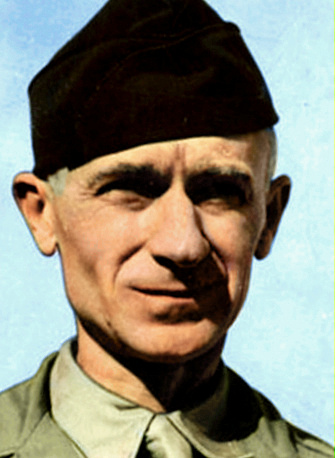The Pittsburgh Press (April 3, 1945)

Roving Reporter
By Ernie Pyle
OFF THE OKINAWA BEACHHEAD (by Navy radio) – This is the last column before the invasion. It is written aboard a troop transport the evening before we storm onto Okinawa.
We are nervous. Anybody with any sense is nervous on the right before D-Day. You feel weak and you try to think of things, but your mind stubbornly drifts back to the awful image of tomorrow. It drags on your soul and you have nightmares.
But those fears do not mean any lack of confidence. We will take Okinawa. Nobody has any doubt about that. But we know we will have to pay for it. some on this ship will not be alive 24 hours from now.
We are in convoy. Many, many big ships are lined up in columns with our warships escort on the outsides. We are an impressive escort on the outsides. We are an impressive sight – yet we are only one of many similar convoys.
We left from different places. We have been on our way many days. We are the biggest, strongest force ever to sail in the Pacific. We are going into what we expect to be the biggest battle so far in the Pacific.
Our ship is an APA, or assault transport. The ship itself is a war veteran. She wears five stars on her service ribbon – Africa, Sicily, Italy, Normandy and Southern France. She wears the Purple Heart, Bronze Star and Legion of Merit Silver Star. She has fared well on the other side. We hope her luck holds out in the Pacific.
We are carrying Marines. Some of them are going into combat for the first time. Others are veterans from as far back as Guadalcanal. They are a rough, unshaven, competent bunch of Americans. I am landing with them. I feel I am in good hands.
Two of a stripe
I’ve shared a cabin with Marine Maj. Reed Taylor of Kensington, Maryland. He is a Guadal vet and he jokingly belittles newcomers who weren’t through “green hell.” The major and I are sort of two of a stripe and we get along fine.
We have the nicest cabin either of us ever had at sea. And we’ve take advantage of it by sleeping away almost the whole trip. We’ve slept day and night. So have many others.
There is a daily argument on ship whether or not you can store up sleep and energy for the ordeal ahead. The doctor says it’s nonsense – that you can’t store up sleep.
Between naps I’ve read two books. They are Bob Hope’s I Never Left Home (how I wish I never had) and Bob Casey’s Such Interesting People only I wish I could hear Bob Casey tell all those stories in person, lying on his cot in France and roaring and shaking with his own laughter. Bob’s laughter would be good for us now. A Marione officer said, “I haven’t laughed for three days.”
Nobody complains
Our trip has been fairly smooth and not many of the troops were seasick. Down in the holds the Marines sleep on racks four tiers high. It isn’t a nice way to travel. But I’ve never heard anybody complain. They come up on the deck on nice days to sun and to rest and to wash clothes, or lie and read or play cards.
We don’t have movies. The ship is darkened at subset and after that there are only dim lights. The food is good. We get news every morning in a mimeographed paper and once or twice a day the ship’s officers broadcast the latest news over the loudspeaker.
They’ve kept us informed daily of the progress of the Okinawa bombardment that preceded our landing. Every little bit of good news cheers us. The ship, of course, is full of rumors, good and bads, but nobody believes any of them.
Daily briefings
Meetings are held daily among the officers to iron out last-minute details of the landing. Day by day, the Marine troop are fully briefed on what they are to do.
Everything we read about Okinawa stresses that the place is lousy with snakes. It’s amazing the number of people who are afraid of snakes. Okinawa “snake-talk” crops into every conversation.
On the last day we changed our money into newly manufactured “Invasion Yen,” drew two days K rations, took a last bath, and packed our kits before supper. We had a huge turkey dinner and, say, we have steak and eggs for breakfast.
“Fattening us up for the kill,” the boys laughingly say.
At 3 o’clock on the last afternoon there was a celebration of the Lord’s Supper. It was the afternoon before Easter Sunday. A lot of us could not help but feel the tragic irony of it, knowing about tomorrow’s battle.